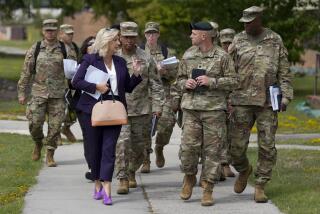All 2.1 Million in Military Service to Get AIDS Tests
WASHINGTON — The Defense Department, going beyond the recommendations of its own medical advisory board, has decided to expand its current testing program and check all 2.1 million members of the military for exposure to the AIDS virus, a Pentagon official said Friday.
The test, which now is limited to new recruits, will be introduced in stages, the official said. First priority will be given to personnel stationed in parts of the world with high rates of disease and poor medical facilities.
AIDS, or acquired immune deficiency syndrome, is a fatal disease that destroys the body’s immune system, leaving it defenseless against infection.
The official said that military personnel who test positive for AIDS antibodies but show no signs of the disease will be placed on a limited service and medical care observation program. Those who actually develop AIDS most likely will receive medical discharges. Recruits with positive results are rejected for service.
“Eventually we hope to have everyone tested, but there are priorities,” said the official, who spoke on the condition that he not be identified. “We’re not going to line up all 2.1 million people and do them in a day.”
The Pentagon’s decision marks the first large-scale use of the test as a diagnostic tool. The test was developed to help blood banks screen out blood contaminated with the AIDS virus, known as HTLV-III.
Critics contend that the decision, which comes amid increasing public concern about the spread of AIDS, could set an example for businesses and insurance companies that already are considering requiring the test as a prerequisite for jobs and insurance.
Homosexual rights groups charged Friday that the expanded military testing would fuel the “hysteria” over AIDS, which has struck primarily male homosexuals and bisexuals, intravenous drug users and their steady sexual partners.
“As the nation’s largest employer, the miliary’s decision legitimizes blanket testing, even though there is no evidence of transmission in the workplace,” said Jeff Levi, political director of the National Gay Task Force.
Nancy Langer of the Lambda Legal Defense and Education Fund called the decision “one more misuse of the test,” which was not developed as a diagnostic tool.
Detects Antibodies
The test indicates exposure to the AIDS virus by detecting the presence of AIDS antibodies. A person who tests positive does not necessarily have the disease. Researchers believe that only 5% to 20% of those who have been exposed to the virus eventually contract AIDS.
Pentagon officials repeatedly have contended that their screening program, which began with recruits in September, is not intended to identify homosexuals, who are prohibited from serving in any branch of the armed services.
“We are taking these steps because of the danger and threat posed by this fatal disease,” a department official said. “This disease impacts significantly on our readiness. The military is a closed system. We have needs that are unique.”
Battlefield Transfusions
The Pentagon’s primary medical concerns about AIDS are that it could be spread through direct blood transfusions on the battlefield, and that victims of it would be exposed to life-threatening diseases and dangerous inoculations in military assignments.
California Rep. Henry A. Waxman (D-Los Angeles), chairman of the House Energy and Commerce subcommittee on health, said he does not oppose the Pentagon’s use of the test “for special reasons related to military situations.”
But Waxman said he is concerned that it not be used “to throw people out of the service who may never get AIDS” or to discharge AIDS victims, “making them uninsurable and dependent on public support.”
14,125 Cases Reported
As of Monday, 14,125 cases of the disease had been reported nationwide, with 7,157 deaths. AIDS is transmitted by sexual contact, primarily through the exchange of body fluids, and by shared hypodermic needles and blood transfusions.
The new Pentagon policy, which is expected to be formally announced next week, is broader than the one recommended last month by the Armed Forces Epidemiological Board, a panel of independent civilian scientists that advises the Pentagon on public health issues.
In a Sept. 17 memorandum, the board urged that all active-duty personnel scheduled for overseas duty, where exposure to diseases is higher, be tested. It added that “the periodic screening of all military personnel is not recommended.”
Excessive Costs Cited
The memo, directed to Dr. William Mayer, assistant secretary of defense for health affairs, and the surgeons general of the three branches of the military, said that the recommendation was based on the “excessive screening costs weighed against low risk and the inability to ensure the absence of infectivity by random testing.”
A Pentagon official said Friday that the decision to conduct broader testing was based on matters of public health. “Like the majority of the population, our concern is--how high are the risks?” he said.
He said that Defense Secretary Caspar W. Weinberger is expected to give the policy final approval after details of the limited-service programs are worked out. No date has been set for the program to begin.
More to Read
Sign up for Essential California
The most important California stories and recommendations in your inbox every morning.
You may occasionally receive promotional content from the Los Angeles Times.










